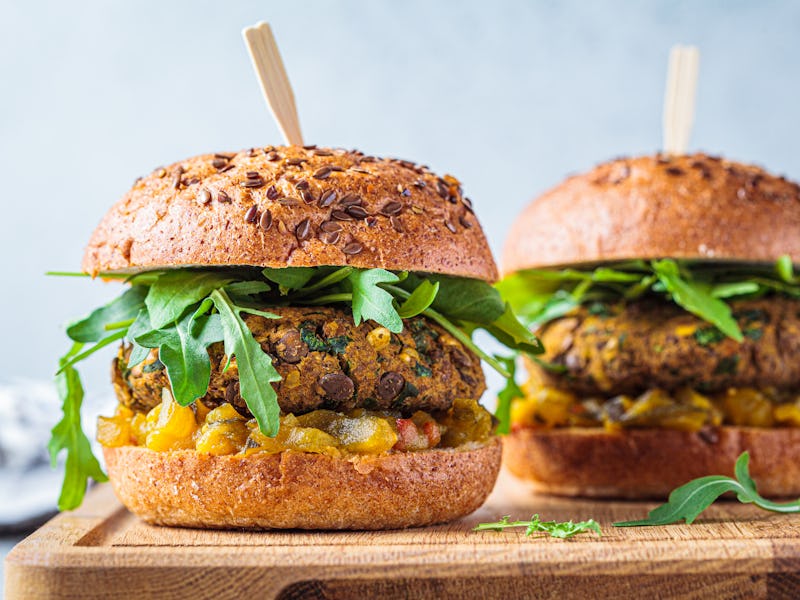How should you barbecue plant-based meat? A vegan nutritionist reveals the secret
It’s easier than you might think.

The informal beginning, middle, and end of summer are marked by three long weekends doused in barbecue sauce: Memorial Day, Fourth of July, and Labor Day. With each passing year, vegans and vegetarians have more options at what are traditionally meat fests. Some omnivores may even opt for plant-based over ground beef.
If you’re an omnivore with years of experience cooking burgers and brats, the idea of cooking plant-based meats, such as Beyond Meat or Impossible Burgers, may seem daunting. Or, perhaps you’re inclined to cook them as you would animal meats.
Registered dietitian and vegan Anya Todd gives us her science-backed ways to cook the plant-based version of everyone’s barbeque favorites.
How should I grill plant-based foods?
Good news: “The method of preparation is still essentially the same,” Todd writes to Inverse. As with meat, reaching proper internal temperature achieves food safety and maximum flavor. Many veggie burgers, Todd says, recommend an internal temp of 165℉, which amounts to cooking the patty for 4 to 5 minutes per side; Beyond Meats also recommends this internal temperature for their products.
One big difference is that you shouldn’t gauge a plant-based burger’s doneness by looking inside. Even Beyond Meats’ website says that a perfectly cooked burger may be red or pink inside and along the edges.
But you absolutely need to cook it, even if it is fake meat. Uncooked plant-based meats still carry the risk of food poisoning from any bacteria that may be lurking. Furthermore, your body may have a hard time digesting an uncooked patty because the raw pea protein inside is often easier on the gut after it's been cooked.
Why the right condiments are key to a plant-based burger
Often the accouterments make the burger or dog. Todd writes, “the key to a great burger or brat is the bun, and you can’t beat a toasted pretzel bun.”
Vegetables add flavor, color, and nutrients to any meal, Todd says. Meat-lovers will willingly acknowledge that fruits, like pineapple, also have a place on the grill and even on a burger. Grilled peaches are another good addition.
There are numerous vegan cheeses and mayonnaises for sale, and most popular condiments like pickles, ketchup, mustard, and relish are already plants. Grilled peppers and onions, avocado slices, and vegan coleslaw are options as well.
Are plant-based burgers and hot dogs healthier than meat burgers and hot dogs?
Ah yes, the favorite question about meat alternatives.
“I don’t think a diet of burgers (plant-based or otherwise) is the cornerstone of health,” Todd writes. Too much of anything is never a good thing. Nutrition, Todd writes, is less about a single meal and more about everything one typically eats in a day or throughout the week. As long as you’re not eating barbeque (carnivore or herbivore) every day, it’s great to enjoy.
On the other end of the spectrum, there’s a concern that plant-based burgers are so processed they’re worth avoiding entirely, which Todd disagrees with. “It’s a manufactured burger — there will be sodium, there will be added fat (and guess what, that is usually what makes food taste good!)” she writes.
Barbecue-goers don’t eat burgers and hot dogs because they’re healthy, but because they’re tasty. Plant-based burgers and dogs aren’t meant first and foremost to create a healthy version, but simply an animal-free version.
With a plethora of barbeque options out there for vegans, it’s good to be prepared for any guests that might show up requesting an Impossible Burger. Instead of offering them a bowl of iceberg lettuce, dazzle them with an elaborate display of plant-based options, cooked and raw.
CHECK, PLEASE is an Inverse series that uses biology, chemistry, and physics to debunk the biggest food myths and assumptions.
Now read this: Does smoked meat cause cancer? A dietitian assesses the damage
This article was originally published on